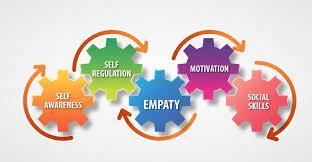7 Smart Phrases People With High Emotional Intelligence Keep Saying Over and Over, and Why
Curated from: inc.com
Ideas, facts & insights covering these topics:
18 ideas
·24.6K reads
139
4
Explore the World's Best Ideas
Join today and uncover 100+ curated journeys from 50+ topics. Unlock access to our mobile app with extensive features.
7 Smart Phrases People With High Emotional Intelligence Keep Saying Over and Over
What is emotional intelligence? How do you improve yours? Why should you even care?
Personally, I'm more likely to do things if they're easy. That's why I'm a big fan of the simplest emotional intelligence-improving idea I've ever come across: memorizing specific words and phrases that leverage emotions in positive ways to make it more likely you'll achieve your goals.
Over time, these phrases become second-nature, you begin to notice why they work.
155
2.14K reads
It's sort of like learning phrases in a foreign language phonetically, only to realize after using them for a while that you better understand what they actually mean and how to spell them.
Here are seven smart, simple, specific things that people with high emotional intelligence learn to say reflexively, over and over.
142
1.93K reads
1. "Let's think about why."
"Why" is a magic word. It's like a linguistic can opener that pries motivations free, and separates emotion from objectivity.
- "Why are we all competing to buy the same product?"
- "Why am I working so hard on this one particular project?"
- "Why am I so quick to respond when this demanding client asks something of me?"
- "Why am I still working late nights and weekends, when my family would rather have me home?"
- "Why is the person in that car yelling at me?"
176
2.05K reads
People who challenge themselves to ask this question over and over, both silently (to themselves) and out loud, are more likely to find the things that they're emotionally motivated to achieve, and to avoid the ones they don't.
And when they find unhealthy emotions acting as the driving forces, they can look elsewhere.
141
1.79K reads
2. "Thank you." (Also "please" and "you're welcome.")
Politeness costs nothing. But people with high emotional intelligence understand that gratitude is one of the keys to happiness in life, which can only leave people feeling good about those who express it to them.
- Bonus point no. 1: Find opportunities to end conversations with expressions of sincere, uncontroversial thanks. (Emphasis on "uncontroversial." Things like "Thank you for taking the time to talk," as opposed to "Thank you for coming around to my point of view.")
163
1.69K reads
- Bonus point no. 2: Saying "You're welcome," instead of more dismissive phrases like "No problem," acknowledges that you've done something for someone else that is worthy of gratitude. It's a trigger for positive reactions in others.
They're such short phrases, and we use them all the time. But emotionally intelligent people do so intentionally--going into conversations looking for an opportunity to repeat them, because they learn how powerful they can be.
145
1.62K reads
3. "No, thank you."
Yes, I listed this one next because it's the seeming opposite of the previous phrase. But, good fences make good neighbors, and healthy boundaries make for healthy relationships.
In short, people with high emotional intelligence understand that saying no when they're offered something they don't really want, whether it's a business opportunity or an invitation or a flyer on the street, is a mark of respect to other people.
It says you respect your time, and you're going to respect other people's as well.
154
1.43K reads
4. "Can I see if I understand?"
There's a lot of power packed into these six words, and emotionally intelligent people appreciate why.
First, no matter what happens after this sentence, you've signaled to someone else that you care to make the attempt to understand where they're coming from. You're not assuming you understand and you're not ignoring them. You're making the effort.
Second, the fact that it's phrased as a question? Chef's kiss. There's emotional power in asking permission like this, and it likely gives you leeway as you articulate your understanding.
169
1.44K reads
Finally, it's powerful because if you're asking to understand, you're not saying things that are less effective at building rapport; for example, summarily assuming "Look, I know how you feel."
Whether we're talking about people's deep convictions, or their experiences -- or even the details of a supply they need to purchase, or driving directions -- everyone wants to be understood. But, most people also understand how difficult it is to do that, if you truly mean it.
Anyway, ask the question like this, and then articulate what you think you understand as a test. You'll be amazed at the results.
145
1.09K reads
5. "I make this mistake all the time ..."
Quick background on this one. People with high emotional intelligence understand that if you want someone to agree with you, or to choose the course of action you want them to follow, it makes sense to make it easy for them to do so.
153
1.36K reads
It sounds basic, but this is the exact opposite of the way many people try to persuade others to do things: basically by brute force. Just imagine the emotional reaction you'd have to someone saying each of the following two things to you, and comparatively how likely you'd be to go along:
- Example no. 1: "I can't believe you were so foolish as to make this mistake! You need to fix it right now!"
- Example no. 2: "I make this mistake all the time; it's so easy to miss. I wonder if you'd check and see if you might have done something similar."
151
1.03K reads
See what I mean? Granted, "I make this mistake" is a bit of a placeholder phrase on this list; the point is to use your words to create emotional safety valves that make it easier for people to shed negative emotions in any situation, and simply act in your interest.
Starting out by stating that you often make the very mistake you're about to discuss suggests that there's not an issue of moral failing or superiority here (warning: bad emotions!). You're just looking for answers.
144
884 reads
6. "Can I ask for some advice?"
If there's a person on this beautiful planet of ours who isn't flattered when asked to give their advice, I haven't met them. So, almost no matter what else you follow this question with, people with high emotional intelligence know that it's geared to trigger a warm response.
But, there's actually a centuries-old technique attached to this, in that people are also hard-wired to want to be able to help others -- or at the very least, to know that they could help others if they wanted to. (Ben Franklin wrote about this phenomenon in the 1770s.)
159
937 reads
7. "I expect a lot from you ..."
We'll end with a phrase that's truly next-level, because it probably presages something negative, but it works anyway. In short, these six words can only be taken as a compliment, but they're very likely to be followed by something more difficult:
- "I expect a lot from you, but this time you came up short."
- "I expect a lot from you, and that's why I'm so disappointed."
- "I want you here because you're amazing, and I need to know I can rely on you."
154
1.05K reads
On Dax Shepherd's Armchair Expert podcast, Bill Gates once explained how this kind of approach was key to his leadership style at Microsoft. Actually, Gates used a slightly different phrase: "The reason you're here is because you're amazing."
But, as you might expect, it was often followed with something like, "But, you're not meeting expectations at the moment." These kinds of phrases are designed to leverage other people's pride and even guilt, to get them to perform.
153
926 reads
Emotional Intelligence Quote
“There is no separation of mind and emotions; emotions, thinking, and learning are all linked.”
-Eric Jensen
154
1.35K reads
IDEAS CURATED BY
CURATOR'S NOTE
7 Smart Phrases People With High Emotional Intelligence Repeat Over and Over
“
Tom Joad's ideas are part of this journey:
Learn more about leadershipandmanagement with this collection
How to showcase your skills and experience
How to answer common interview questions
How to make a good first impression
Related collections
Similar ideas
Read & Learn
20x Faster
without
deepstash
with
deepstash
with
deepstash
Personalized microlearning
—
100+ Learning Journeys
—
Access to 200,000+ ideas
—
Access to the mobile app
—
Unlimited idea saving
—
—
Unlimited history
—
—
Unlimited listening to ideas
—
—
Downloading & offline access
—
—
Supercharge your mind with one idea per day
Enter your email and spend 1 minute every day to learn something new.
I agree to receive email updates


